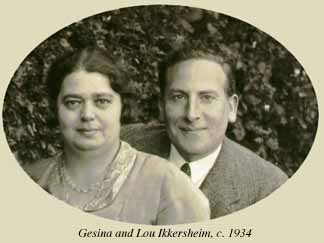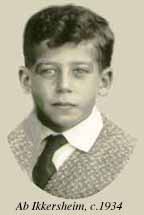
Mia, Ab and Wim are the children of Israel and Gesina Ikkersheim, a Jewish family from The Hague. Wim was born in 1925, Ab two years later, and Mia, the youngest, was born in 1930. Mia was nine years old when the war broke out, and fourteen when it ended.Before the war, the family lived comfortably, supported by their father's home furnishings business. In 1942, Israel Ikkersheim, known to his friends as Lou, made the hard choice to defy Nazi orders to report to Westerbork concentration camp. He abandoned his business and fled with his family to Huizen, where they spent the remaining war years under the protection of many different households. In Huizen Lou worked in Bert Bochove's store where he was known to all as Peter; his blond hair and blue eyes made the deception possible. He and Bert became good friends. The Ikkersheim parents and children lived in the Bochove home off and on during their years underground.Wim and his mother were forced to hide in Bert's secret attic space during the harrowing hours of the S.S. raid of the Bochove premises.
The following conversation between Mia, Ab, and Wim Ikkersheim took place at Ab's home in Leiden, Holland, August 16, 1996.

Family:
MIA IKKERSHEIM: My father was a handsome man. He was always in a good mood. From the moment he got up in the morning, he would be singing, full of humor and jokes. He always saw the bright side. My mother was the opposite--a pessimist. She saw things realistically. They were a very good couple.
My mother was a very kind person. She believed that people were fundamentally good. She never gossiped.
"Not in my house," she would say. "If you want to talk about so and so, please, not here."
AB IKKERSHEIM: We were not religious in our family, just Jewish, that's all.
MIA:We never prayed or went to the synagogue, but we had a kosher home. Some of the family cared about being kosher, some didn't, but my mother wanted to be sure that all of them could eat with us, that everyone would feel at home. We had two sets of dishes, milk and meat separated, pans and everything, even the towels--one set was blue, the other red.
 The war starts:
The war starts:
AB: Everybody could see it when the war started in Holland. Planes were flying--parachutists--bombing--but until the beginning of '41 there was no special trouble for the Jews.
MIA: We had heard a lot about the problems of the Jews in Germany because so many German Jews had come to Holland. When the war started, nobody thought the Germans would come here. But they came. Then we knew we would be treated the same way as the Jews from Germany.
AB: First, I was not allowed to go to school.
MIA: I was in a Jewish school so I could continue, but I had to wear the star with the J. There were all kinds of measures, every day something else, always going further and further. Forbidden for Jews: you are not allowed to go out after 8 o'clock in the evening, you may not go to the theater, you may not go to the park.
AB: And every week we said, if that is it, OK, we can live with it; then the next week there was another one, and the next week another one.
There was a popular notion that the Jewish people are privileged. You could read in the Bible that they are God's chosen people. But I didn't feel privileged at all--just the opposite. I couldn't understand why it was a privilege to be a Jew.
MIA: We had a lot of bad people--N.S.B'ers (Dutch National Socialists)--in the neighborhood. We were living next door to a very famous Wehrmacht leader, the head of The Hague W.A., the fighting part of the N.S.B. But he liked us. He said if all the Jews were like the Ikkersheims then there would be no problem. It was crazy. On the other side of the street there were the Brown Shirts, but they were Germans. It was frightening. We were surrounded.
 We were told to mark our clothes with our names in case we had to go to Poland, to the concentration camps. Everybody we knew had to go. So my mother began preparing the whole family for Poland. She and I were sewing our initials in all of our clothes.
We were told to mark our clothes with our names in case we had to go to Poland, to the concentration camps. Everybody we knew had to go. So my mother began preparing the whole family for Poland. She and I were sewing our initials in all of our clothes.
AB: My father got the letter saying he had to go to work in Westerbork, But he was scheduled for an operation on his leg in the hospital, so he couldn't leave for Westerbork right away.
After the operation, he said we wouldn't go, he would try to make contacts for us to go underground instead.
WIM IKKERSHEIM: The first idea was to go to Switzerland, but it was very tricky. You had to find a good route, and the Swiss were sending a lot of people back. Then one day my father decided it was too dangerous to stay any longer, we have to go now. My mother's sister knew the woman who was the first to hide us.
MIA: A few weeks before, my mother and I began to remove all the identification we had sewn in our clothes.
"We won't be going to Poland, but to a different place," she told me. Every day she would say, "Don't talk about it! Don't talk about it!" It is very difficult for a child, knowing you are going to hide or go away, not to tell your best girlfriend. My mother knew me too well. Over and over, several times a day she warned me, "keep your mouth shut," and I did. But it was very hard.